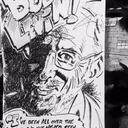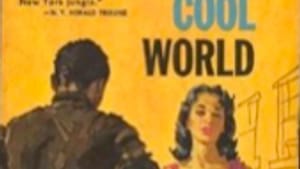Stay in the Loop
BSR publishes on a weekly schedule, with an email newsletter every Wednesday and Thursday morning. There’s no paywall, and subscribing is always free.
I. Rebels without a cause
In David Halberstam's chapter on Grace Metalious in The Fifties, I learned that her novel Return to Peyton Place had been doctored into publishable health by Warren Miller. When I saw that name, I didn't immediately associate with ski music on snowy movie soundtracks. Instead I thought: The Cool World.
Considering the impact Miller's novel had on me, it was surprising how little I knew about its author. Warren Miller came out of the Iowa Writers Workshop and published nine books between 1958 and 1964. According to Wikipedia, the combination of his "outspoken political views" and his premature death from lung cancer in 1966, at age 45, rendered Miller "relatively unknown today."
But The Cool World permanently enshrined him within my personal Pantheon. It appeared in 1959, the first person narrative of Duke Custis, 14-year-old War Lord of the Royal Crocodiles, a Harlem gang.
I was in 11th grade at Friends' Central and had never "“ and, to this day, have not yet"“ read anything that, to my middle-class Jewish ear, so well captured the rhythm and language of what I took to be those streets. (Just the other day, sharpening a scene for a work-in-progress, I turned to The Cool World for dialogue enhancement.)
Its opening sentence"“ "They call him Priest because he always wear black""“ with its immaculately calibrated dropped "s""“ had grabbed me and the friends with whom I shared other identity-shaping passions, from Mad comics through pre-Elvis rock 'n' roll. We were in the process, though we didn't know it yet, of trying to become hip"“ or "hep," as Duke Custis would have it"“ in order to differentiate from our bland environs; and Miller's book became a piece in the stand-apart assemblages we were constructing.
It was so neat to know shitman as one word. It was so fulfilling to hold a piece of excellence to which most of the world was blind. In tandem with Catcher in the Rye and Martian Chronicles, it was among the few books I would carry out of adolescence into adulthood, long before I discovered Hemingway and Fitzgerald and Faulkner.
Long before I thought of writing as something I could do, The Cool World planted a flag atop a hill. It was a means of assertion. A badge among a brotherhood. It said: If you could render the distinct you would make a mark.
II. The path to soul-saving deviance
What do The Hustler and The Man Who Fell to Earth have in common? I used to ask people. No one knew. When I said they were written by the same man, they hadn't heard of him.
Walter Tevis was born in 1928. During the 1950s, he published short stories in Esquire, Saturday Evening Post, Colliers, Redbook and Cosmopolitan. The Hustler, his first novel, was published in 1959. The Man Who Fell to Earth, his second, in 1963. He didn't publish another for 17 years.
I read The Hustler first as a short story in Playboy. If my memory is correct, I saw it as a TV drama, though no such adaptation is credited on the Walter Tevis website. I read the novel more than twice. I saw the movie more than that.
In 1963, when a friend and I drove cross-country after our junior year at Brandeis, there were two places we had to see in San Francisco: City Lights Books and the Market Street pool hall where, we believed, Paul Newman had played Jackie Gleason. (We were misinformed. While researching this piece, I learned that those scenes were shot at Ames Pool Hall in New York City.)
The Hustler was one of those markers by which we hoped to fight our way clear of the dreary, stultifying grind-you-down, stamp-you-out assembly line world in which we grew up. It pointed a way, we hoped, toward transformative, glorious, flame-burning, soul-saving deviance. To this day, when I describe my first book, I say, "It's an existential sports novel, like Fat City or The Hustler." I wouldn't be more proud to be associated with Ulysses.
In about"“ I am guessing "“ 1980, I saw a flyer announcing that Tevis was reading at Cody's Books in Berkeley. This was before authors' readings were regular events in book stores. (I had lived in Berkeley 12 years and hadn't attended any.) The crowd, as I recall, was small. I sensed that nearly all were there because of his second book's David Bowie connection.
When Tevis took questions, I raised my hand. I think"“ at least I'd like to think"“ I told him what The Hustler had meant to me. Then I asked Tevis how he had moved from its nitty-gritty realism into science fiction.
He replied that he was an alcoholic. The Man Who Fell to Earth, he said, was his rendition of what his life had been like on this planet.
Over the next four years, Tevis published four more novels. He died, also of lung cancer, in 1984.♦
To read responses, click here.
In David Halberstam's chapter on Grace Metalious in The Fifties, I learned that her novel Return to Peyton Place had been doctored into publishable health by Warren Miller. When I saw that name, I didn't immediately associate with ski music on snowy movie soundtracks. Instead I thought: The Cool World.
Considering the impact Miller's novel had on me, it was surprising how little I knew about its author. Warren Miller came out of the Iowa Writers Workshop and published nine books between 1958 and 1964. According to Wikipedia, the combination of his "outspoken political views" and his premature death from lung cancer in 1966, at age 45, rendered Miller "relatively unknown today."
But The Cool World permanently enshrined him within my personal Pantheon. It appeared in 1959, the first person narrative of Duke Custis, 14-year-old War Lord of the Royal Crocodiles, a Harlem gang.
I was in 11th grade at Friends' Central and had never "“ and, to this day, have not yet"“ read anything that, to my middle-class Jewish ear, so well captured the rhythm and language of what I took to be those streets. (Just the other day, sharpening a scene for a work-in-progress, I turned to The Cool World for dialogue enhancement.)
Its opening sentence"“ "They call him Priest because he always wear black""“ with its immaculately calibrated dropped "s""“ had grabbed me and the friends with whom I shared other identity-shaping passions, from Mad comics through pre-Elvis rock 'n' roll. We were in the process, though we didn't know it yet, of trying to become hip"“ or "hep," as Duke Custis would have it"“ in order to differentiate from our bland environs; and Miller's book became a piece in the stand-apart assemblages we were constructing.
It was so neat to know shitman as one word. It was so fulfilling to hold a piece of excellence to which most of the world was blind. In tandem with Catcher in the Rye and Martian Chronicles, it was among the few books I would carry out of adolescence into adulthood, long before I discovered Hemingway and Fitzgerald and Faulkner.
Long before I thought of writing as something I could do, The Cool World planted a flag atop a hill. It was a means of assertion. A badge among a brotherhood. It said: If you could render the distinct you would make a mark.
II. The path to soul-saving deviance
What do The Hustler and The Man Who Fell to Earth have in common? I used to ask people. No one knew. When I said they were written by the same man, they hadn't heard of him.
Walter Tevis was born in 1928. During the 1950s, he published short stories in Esquire, Saturday Evening Post, Colliers, Redbook and Cosmopolitan. The Hustler, his first novel, was published in 1959. The Man Who Fell to Earth, his second, in 1963. He didn't publish another for 17 years.
I read The Hustler first as a short story in Playboy. If my memory is correct, I saw it as a TV drama, though no such adaptation is credited on the Walter Tevis website. I read the novel more than twice. I saw the movie more than that.
In 1963, when a friend and I drove cross-country after our junior year at Brandeis, there were two places we had to see in San Francisco: City Lights Books and the Market Street pool hall where, we believed, Paul Newman had played Jackie Gleason. (We were misinformed. While researching this piece, I learned that those scenes were shot at Ames Pool Hall in New York City.)
The Hustler was one of those markers by which we hoped to fight our way clear of the dreary, stultifying grind-you-down, stamp-you-out assembly line world in which we grew up. It pointed a way, we hoped, toward transformative, glorious, flame-burning, soul-saving deviance. To this day, when I describe my first book, I say, "It's an existential sports novel, like Fat City or The Hustler." I wouldn't be more proud to be associated with Ulysses.
In about"“ I am guessing "“ 1980, I saw a flyer announcing that Tevis was reading at Cody's Books in Berkeley. This was before authors' readings were regular events in book stores. (I had lived in Berkeley 12 years and hadn't attended any.) The crowd, as I recall, was small. I sensed that nearly all were there because of his second book's David Bowie connection.
When Tevis took questions, I raised my hand. I think"“ at least I'd like to think"“ I told him what The Hustler had meant to me. Then I asked Tevis how he had moved from its nitty-gritty realism into science fiction.
He replied that he was an alcoholic. The Man Who Fell to Earth, he said, was his rendition of what his life had been like on this planet.
Over the next four years, Tevis published four more novels. He died, also of lung cancer, in 1984.♦
To read responses, click here.
Sign up for our newsletter
All of the week's new articles, all in one place. Sign up for the free weekly BSR newsletters, and don't miss a conversation.
 Bob Levin
Bob Levin
